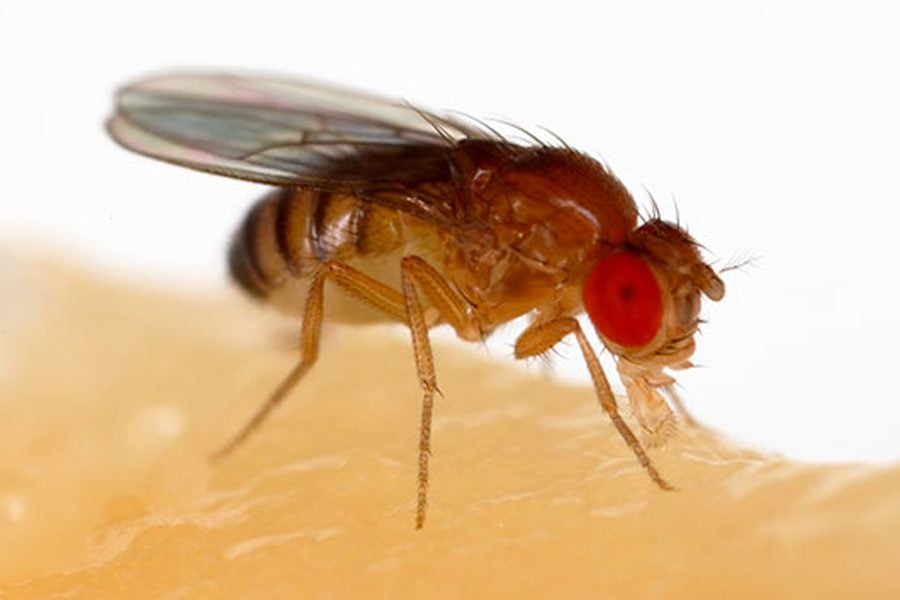Northwestern researchers find possible link between disrupted sleep-cycles and protection against neurodegenerative diseases
A fruit fly. Northwestern researchers experimented on clusters of flies with Huntington’s disease to determine the relationship between altered sleep-wake cycles and neurodegenerative diseases.
April 7, 2019
When Weinberg Prof. Ravi Allada and his research team began altering the sleeping patterns of a group of fruit flies, they thought a disrupted or unusual sleep-wake cycle would prove to be a risk factor for neurodegenerative diseases. To their surprise, the end results pointed towards the exact opposite conclusion.
Their study, published in the science journal Cell Reports, instead suggests that manipulation of a person’s circadian clock helps protect the brain’s neurons against neurodegenerative diseases. According to an April 2 news release, these findings open the door for potential new methods of preventing or slowing down neurodegenerative diseases.
Allada, whose lab specializes in studying sleep cycles and the effects they have on health, told The Daily the idea for the study came from examining other research that has been conducted on neurodegenerative diseases such as Huntington’s disease. Allada noted that evidence suggested unhealthy sleep-wake cycles were a risk factor for neurodegenerative diseases. However, none of the research Allada looked into was able to show if the relationship was causative or correlative, so he said his lab wanted to test the idea that neurodegenerative diseases are caused by poor sleep cycles.
“A lot of the data was circumstantial,” Allada said. “So we did a number of manipulations of the circadian clock and asked, what was the impact of those manipulations.”
Fangke Xu, an eighth-year Weinberg graduate student and member of Allada’s lab, said the team used fruit flies as models for their study because the flies have similar neurons that govern sleep-wake cycles as humans, and experience similar symptoms from neurodegenerative diseases as humans.
Xu said the group started by mutating the flies to have Huntington’s disease. The researchers then put a group of the flies in an altered light-dark cycle where they were experienced 20-hour days. The group mutated another group of flies to alter one of the genes that affects the internal circadian clock.
The effects of their research loosely mimicked the effects of jet lag on the human brain.
“That’s where the ‘jet lag’ word comes from but it’s not really jet lag,” Xu said. “It’s more like resetting the clock every day.”
For both groups of flies, the team found Huntington’s disease ended up killing fewer neurons than average, to the surprise of the researchers.
The team then took the research further by locating the “heat shock organizing protein” gene that is regulated by the body’s circadian clock and is responsible for folding proteins, and knocking it down. The researchers discovered that knocking down the gene in flies with Huntington’s disease resulted in fewer diseased proteins being accumulated and prevented the deaths of more neurons.
Postdoctoral researcher Marta Iwanaszko said the results of the research were exciting because of how unexpected they were.
“They were pretty much the opposite of our initial hypothesis,” Iwanazko said.”We all assumed (altering the circadian clock) should be detrimental to the neurodegenerative disease, but from our experiment, for this particular mutation, we were actually able to prevent cell death.”
Iwanazko said the research could be extremely useful for future treatment of neurological diseases, as the manipulation of circadian cycles could be used as a way to detect and treat Huntington’s disease. She also said the lab was likely going to investigate future ways in which sleep-wake cycle disruption could be used for treatment with future models, and the lab is looking to use more complex organisms such as mice for future research.
Email: [email protected]
Related Stories:
– NU researchers develop new optical technology that may one day replace traditional refractive lenses
– Northwestern researchers roll out new sensor to track newborn vital signs
– Northwestern collaborates with the Georgia O’Keeffe Museum to develop ‘art acne’ tracking technology


